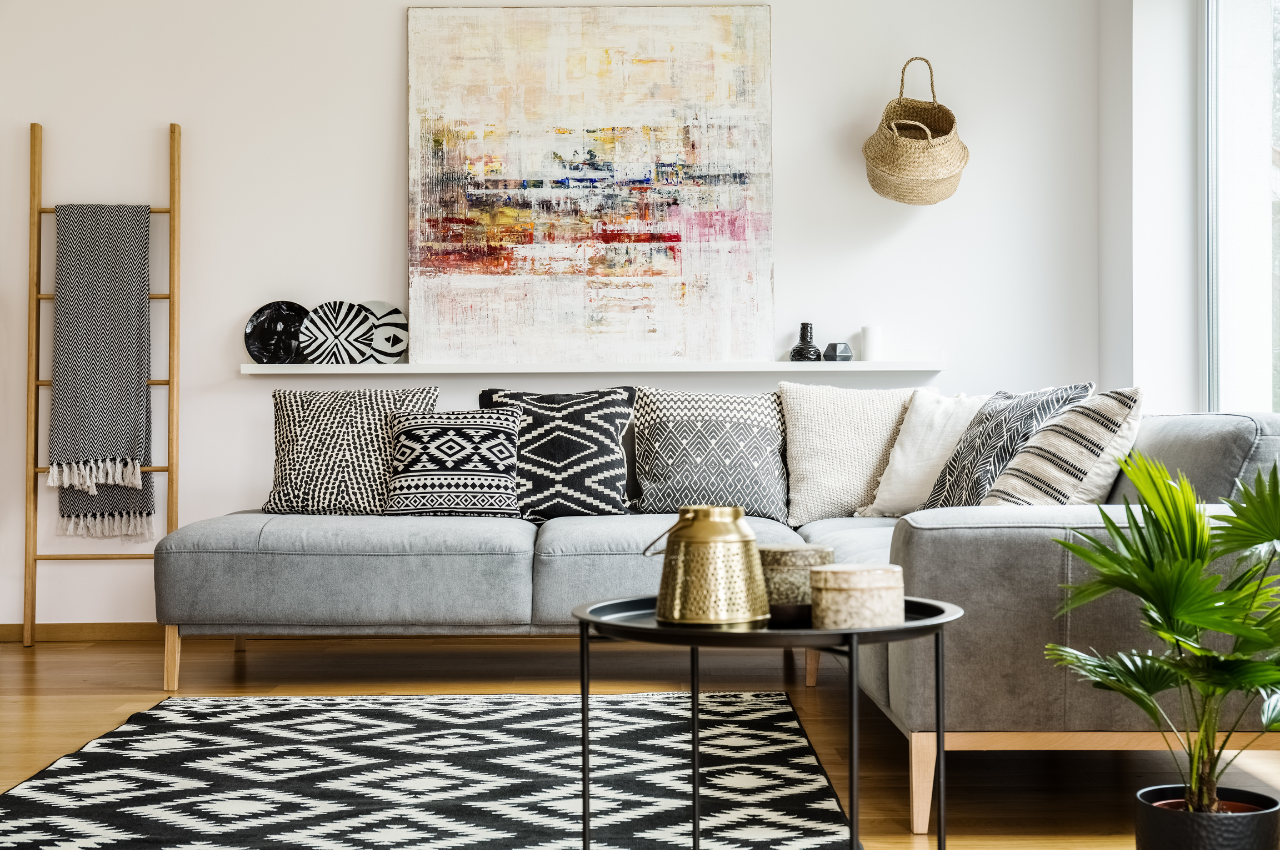Are you feeling unbalanced and out of harmony in your home? It might be time to consider rearranging your furniture for better Feng Shui.
Feng shui is an ancient Chinese practice concerned with arranging the elements in a space to create harmony and balance. By harnessing the powerful energy flow, known as chi, within your space, you can unlock a world of balance and well-being.
Furniture placement is a significant aspect of Feng Shui. This makes sense, considering that our homes are our immediate environment where we spend most of our time in. Strategically arranging furniture may enhance the positive energy flow in your home, which is beneficial to you, in one way or another.
In this article, we'll explore some furniture placement tips with Feng Shui in mind. They might help create a space that helps you feel lighter, more comfortable, and more supported.
Bedroom
Maintaining a positive energy flow in the bedroom is very important. We spend a significant portion of our lives sleeping, so it's important to keep our bedrooms free from negative energy and any physical disturbances.
Even if you do not believe in Feng Shui, it is only reasonable to do this because our bodies need a conducive environment for recovery and the mind to find rest.
Place your bed in the command position.
Furniture placement in the bedroom is key to achieving good energy flow—and the most important piece in this space? Your bed frame.
It is essential for your bed to be placed in a commanding position. Place it in a spot where you can see the door, but not directly in line with it. This gives you a sense of security and control.
Ideally, the headboard is right up against a solid wall, with room to the right and left for bedside tables or lamps. This creates stability, and having room on both sides of the bed allows energy to flow freely.
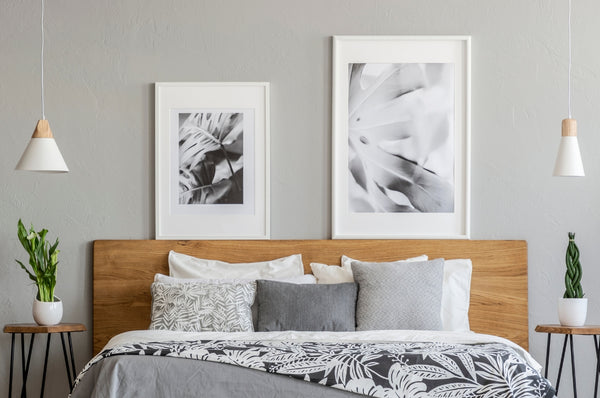
Avoid placing your bed under a window.
As far as windows go, it's best not to place your bed directly underneath them, especially if your bedroom is on the ground floor. However, in some situations, it may be necessary to do so if the room layout restricts other placement options.
But putting your bed can still create a sense of insecurity due to potential safety concerns. To prevent this, make sure your bed frame is made from natural solid wood that comes with a strong and heavy headboard.
Keep the space under your bed free of clutter.
Create a serene sleeping sanctuary by keeping the space under your bed clear of any clutter. This ensures that the energy can freely flow around you as you sleep.
If you have limited storage space, you can still maximize the area under your bed. Use it to store soft items like bedding or extra pillows, and avoid stowing away so much stuff. Let the space breathe.
Keep in mind though that storing sharp or hard objects like suitcases, shoes, or books under the bed is not ideal.
Living Room
The living room couch or sofa is typically the largest and most functional piece of furniture in the area's active zone. So, it's very important to find the ideal spot for it when arranging this space for good energy.
Place your sofa in the command position.
To create a sense of control and security in your space, position your sofa with its back facing a large solid wall. It's like anchoring your couch to the most secure side of the space. In Feng Shui, protecting the back is considered important because it is often the most vulnerable area, allowing unwanted qi or negative energy to easily enter.
But what if this position is unattainable due to your room's layout?
The important thing to remember here is that you arrange your couch or sofa in a way that minimizes foot traffic behind it. These pathways can disrupt the flow of energy, which may not be ideal for sitting behind.
To create the illusion of a solid wall, place a piece of furniture behind the sofa to mimic the effects of a solid wall. It is ideally the same height as the sofa. Choose a sturdy and heavy piece, like a solid wood credenza, to prevent the sofa and furniture from shifting when you move.
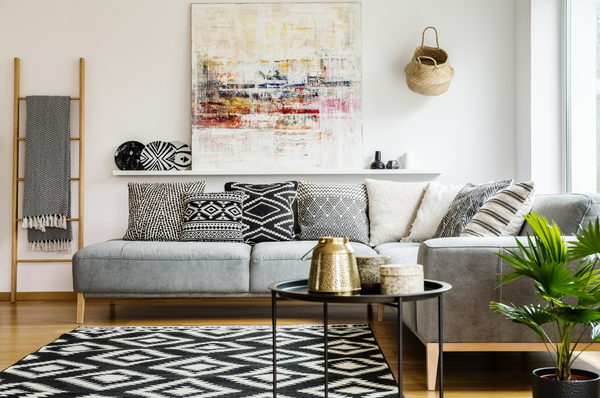
Choose an arrangement that promotes flow.
Promote an ease of movement throughout your living room. When your space is too cramped with furniture and decor, the energy cannot flow freely, causing it to stagnate. Arranging the sofa and chairs in a U-shape around the coffee table encourages good flow and conversation.
Another thing - consider pulling your furniture slightly away from the walls, a couple of inches will do, to create a more open and airy atmosphere. Placing them directly against the walls hinders the flow of energy.
Add plants and flowers.
Plants and flowers are said to bring positive energy into a space. Choose plants that are healthy and thriving, preferably those with large round leaves to invite prosperity. Avoid plants that have pointy, needle-like leaves.
Kitchen
When it comes to the kitchen, the Feng Shui energy interacts with an active energy that is created from preparing meals.
While the kitchen is not exactly a haven of furniture, it may still come in handy for you to know the basics in arranging the main elements in this area.
Place your stove in the command position.
Positioning your stove strategically in the kitchen allows you to take charge of your culinary domain. Make sure it is not in a direct line with the doorway, so you can keep an eye on your cooking as well as invite exciting opportunities in your life.
If it is not possible to move the stove, an alternative solution would be to position a mirror in a way that allows you to see the reflection of the door while cooking.
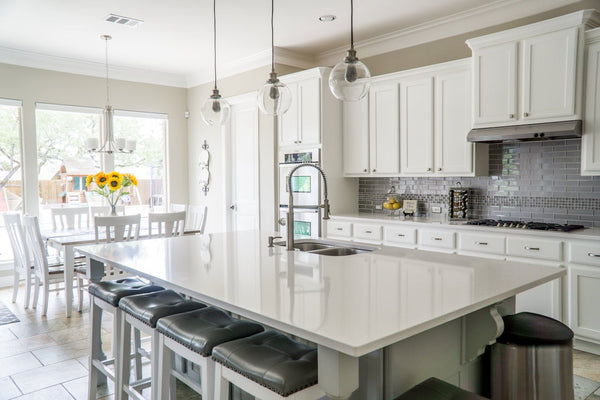
Keep the stove in harmony with the sink and fridge.
Your stove belongs to the fire element, and it is important to keep it balanced with the other elements in the kitchen.
Avoid placing it directly facing the sink, as this causes a clash between the elements of fire and water. Moreover, steer clear of positioning the stove towards the fridge, which symbolizes abundance and belongs to the water element.
It is bad feng shui to position the dining table between two access points. It shouldn’t block the line between windows and doorways. These spaces must remain open to attract health and good luck.
Dining Room
The dining room Feng Shui is centered around the table but also includes the seating arrangement and other features that can affect the energy of the area.
Go for a round, solid wood dining table.
Wood is often considered the best material for a dining table. In Feng Shui, it is believed to be a grounding element that symbolizes stability.
Natural wood is not only aesthetically pleasing in any dining room, but it also has a visually calming effect. Even if you prefer chic and contemporary designs, it is best to avoid glass tabletops. Glass transmits negative energy, similar to sharp corners.
And speaking of sharp corners, round and oval are the best dining table shapes. They allow energy and abundance to flow more smoothly throughout the house.
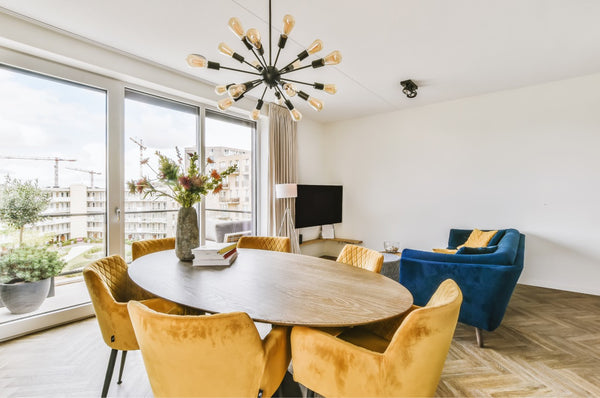
Place the dining table at the center of the room.
The dining table should be kept away from the walls and ideally centered to create a sense of balance and equality. Propping one side against the wall is an uninviting and inefficient use of space.
Another thing is to avoid placing the dining table between two access points. If you're stuck with the placement due to space limitations, hang bells and wind chimes above your windows. They help invite positive energy back into your home.
Turn rectangular dining tables at a slight angle.
For a rectangular table, it is recommended to position it in the center of the dining room, slightly angled to the walls, allowing for a smooth and curved flow of energy around the room.
When the table is aligned straight and parallel to the walls, the energy will flow evenly throughout the room or along the edges and may be trapped in the corners. You can also balance angular dining tables with rounded shapes through rugs and other decor pieces.
Arrange chairs strategically.
To increase a sense of security, avoid seating people with their backs to a door or window. If this arrangement is not possible, strategically place mirrors to reflect entryways.
Keep the number of chairs in even numbers as well. According to Feng Sui principles, having symmetrical and balanced arrangements, such as an even number of chairs around a dining table, can help maintain balanced energies and potentially bring more luck.
Takeaway
The way you arrange your furniture can have a significant impact on the energy and ambiance of your space. Whether you're looking to attract love, improve your health, or increase abundance and prosperity, understanding the principles of Feng Shui might help you achieve your goals.
